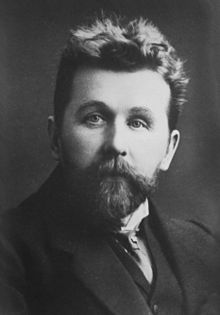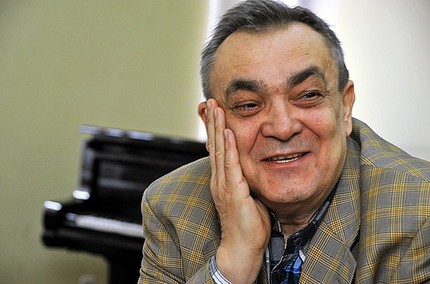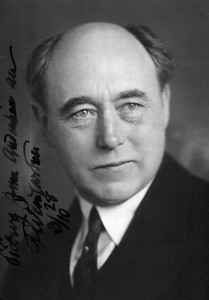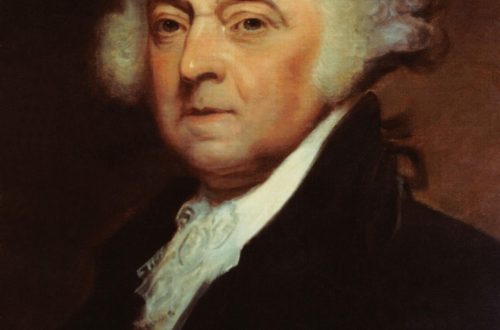
Alexander Tikhonovich Grechaninov |
Alexander Gretchaninov
Grechaninov. “The Special Litany” from the “Demesne Liturgy” (Fyodor Chaliapin, 1932)
Over the years, I became more and more strengthened in the consciousness of my true vocation, and in this vocation I saw my life duty … A. Grechaninov
There was something indestructible Russian in his nature, everyone who happened to meet A. Grechaninov noted. He was the type of a real Russian intellectual – stately, blond, wearing glasses, with a “Chekhov” beard; but most of all – that special purity of soul, the strictness of moral convictions that determined his life and creative position, loyalty to the traditions of Russian musical culture, the earnest nature of serving it. The creative heritage of Grechaninov is huge – approx. 1000 works, including 6 operas, children’s ballet, 5 symphonies, 9 major symphonic works, music for 7 dramatic performances, 4 string quartets, numerous instrumental and vocal compositions. But the most precious part of this heritage is choral music, romances, choral and piano works for children. Grechaninov’s music was popular, F. Chaliapin, L. Sobinov willingly performed it. A. Nezhdanova, N. Golovanov, L. Stokovsky. However, the creative biography of the composer was difficult.
“I did not belong to those lucky ones whose life path is strewn with roses. Every step of my artistic career has cost me incredible effort.” The family of the Moscow merchant Grechaninov predicted the boy to trade. “It was only when I was 14 that I saw the piano for the first time… Since then, the piano has become my constant friend.” Studying hard, Grechaninov in 1881, secretly from his parents, entered the Moscow Conservatory, where he studied with V. Safonov, A. Arensky, S. Taneyev. He considered the Historical Concerts of A. Rubinstein and communication with the music of P. Tchaikovsky to be the greatest events of his conservatory life. “As a boy, I managed to be at the first performances of Eugene Onegin and The Queen of Spades. For the rest of my life, I retained the enormous impression that these operas made on me. In 1890, due to disagreements with Arensky, who denied Grechaninov’s composing abilities, he had to leave the Moscow Conservatory and go to St. Petersburg. Here the young composer met the full understanding and kind support of N. Rimsky-Korsakov, including material support, which was important for a needy young man. Grechaninov graduated from the Conservatory in 1893, presenting the cantata “Samson” as a diploma work, and a year later he was awarded a prize at the Belyaevsky competition for the First String Quartet. (The Second and Third Quartets were subsequently awarded the same prizes.)
In 1896, Grechaninov returned to Moscow as a well-known composer, author of the First Symphony, numerous romances and choirs. The period of the most active creative, pedagogical, social activity began. Having become close with K. Stanislavsky, Grechaninov creates music for the performances of the Moscow Art Theater. The musical accompaniment of A. Ostrovsky’s play “The Snow Maiden” turned out to be especially successful. Stanislavsky called this music excellent.
In 1903, the composer made his debut at the Bolshoi Theater with the opera Dobrynya Nikitich, with the participation of F. Chaliapin and A. Nezhdanova. The opera has earned the approval of the public and critics. “I consider it a good contribution to Russian opera music,” Rimsky-Korsakov wrote to the author. During these years, Grechaninov worked a lot in the genres of sacred music, setting himself the goal of bringing it as close as possible to the “folk spirit”. And teaching at the school of the Gnessin sisters (since 1903) served as an incentive to compose children’s plays. “I adore children… With children, I always felt equal to them,” said Grechaninov, explaining the ease with which he created children’s music. For children, he wrote many choral cycles, including “Ai, doo-doo!”, “Cockerel”, “Brook”, “Ladushki”, etc .; piano collections “Children’s Album”, “Beads”, “Fairy Tales”, “Spikers”, “On a Green Meadow”. The operas Elochkin’s Dream (1911), Teremok, The Cat, the Rooster and the Fox (1921) are specially designed for children’s performances. All these compositions are melodic, interesting in musical language.
In 1903, Grechaninov took part in the organization of the Musical Section of the Ethnographic Society at Moscow University, in 1904 he participated in the creation of the People’s Conservatory. This stimulated work on the study and processing of folk songs – Russian, Bashkir, Belarusian.
Grechaninov launched a vigorous activity during the 1905 revolution. Together with music critic Y. Engel, he was the initiator of the “Declaration of Moscow Musicians”, collected funds for the families of the dead workers. To the funeral of E. Bauman, which resulted in a popular demonstration, he wrote the “Funeral March”. The letters of these years are full of devastating criticism of the tsarist government. “Unfortunate homeland! What a solid foundation they have built for themselves from the darkness and ignorance of the people ”… The public reaction that came after the defeat of the revolution was to some extent reflected in Grechaninov’s work: in the vocal cycles “Flowers of Evil” (1909), “Dead Leaves” (1910), in the opera “Sister Beatrice” after M. Maeterlinck (1910), pessimistic moods are felt.
In the early years of Soviet power, Grechaninov actively participated in musical life: he organized concerts and lectures for workers, led the choir of a children’s colony, gave choral lessons at a music school, performed in concerts, arranged folk songs, and composed a lot. However, in 1925 the composer went abroad and never returned to his homeland. Until 1939, he lived in Paris, where he gave concerts, created a large number of works (Fourth, Fifth symphonies, 2 masses, 3 sonatas for different instruments, the children’s ballet “Forest Idyll”, etc.), in which he remained faithful to Russian classical traditions, opposing his work to the Western musical avant-garde. In 1929, Grechaninov, together with the singer N. Koshyts, toured New York with triumphant success and in 1939 moved to the United States. All the years of his stay abroad, Grechaninov experienced an acute longing for his homeland, constantly striving for contacts with the Soviet country, especially during the Great Patriotic War. He dedicated the symphonic poem “To Victory” (1943), the notes of which he sent to the Soviet Union, and the “Elegiac Poem in Memory of Heroes” (1944) to the events of the war.
On October 24, 1944, Grechaninov’s 80th birthday was solemnly celebrated in the Great Hall of the Moscow Conservatory, and his music was performed. This extremely inspired the composer, caused a new surge of creative forces.
Until the last days, Grechaninov dreamed of returning to his homeland, but this was not destined to come true. Almost deaf and blind, in extreme poverty and loneliness, he died in a foreign land at the age of 92.
O. Averyanova





